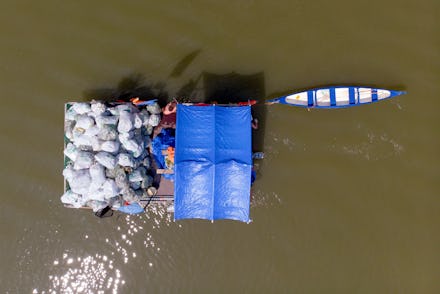Panama is banning plastic bags in an attempt to save its diverse wildlife

Panama is getting ready to do away with plastic bags for good. Over the weekend, the country became the first Central American nation to ban single-use plastic bags. Supermarkets, wholesale stores and other retailers in country will have until 2020 to start complying with the new regulation or face fines. Meanwhile, signs that read "less bags, more life" will be set up on the streets of Panama City to remind residents of the new measures, according to Reuters.
The decision to ditch single-use plastic bags is a small but significant step toward curbing pollution in the isthmus country and the surrounding areas. Panama has long had an issue with plastic waste. According to the Panama Mayor's office, nearly 20 percent of all waste from the country's capital city is plastic. News organization Agencia EFE reported that concerned citizens of Panama have participated in annual clean up days meant to rid Panama City beaches of trash for nearly two decades. Activists in the country claim to collect as much as 60 to 90 tons of waste each year, but note that it's a small drop in the bucket compared to the amount of plastic that seeps into the oceans each year. Lack of adequate trash collection and disposal has had negative effects on Panama, according to a study published in the International Journal of Emerging Markets. Researchers found that inadquate waste services posed serious health risks to the citizenry and even jeopardized the operation of the Panama Canal, which is one of the most important economic fixtures in the country.
It's estimated that 4.8 and 12.7 million tons of plastic waste makes its way into our waterways each year, according to data published in the journal Science. All of that is having a devastating effect on the creatures that call the oceans their home. A study conducted by Plymouth University estimated that plastic pollution adversely affects as many as 700 marine species and is responsible for as many as 100 million marine mammal deaths each year. Activist organization Ocean Crusaders estimates that as much as two-thirds of the world's fish population are also suffering from plastic ingestion, which can result in fish dying before they reach maturity and can repopulate, potentially hurting the livelihood of some species. The United Nations estimates that as much as 80 percent of the litter cluttering the oceans and putting wildlife at risk is plastic. This problem directly effects Latin America and Panama in particular, as it is one of the most bio-diverse regions on earth. A mix of wildlife that includes birds, turtles, whales, fish and a wide range of reptiles that call the area home have been harmed by plastic waste.
While Panama is the first Central American nation to take action against single-use plastic bags, it's certainly not the first country to do so. At this point, much of the world has some form of regulation that restricts the use and consumption of plastic bags. The United Nations Environment Program reports that at least 127 countries now impose legal limits on plastics, though it hasn't made much of a dent on pollution. According to the World Resources Institute, that is becasue many countries don't limit the full life cycle of plastic. China, for instance, bans the import of plastic bags but not their production or export, meaning the country still contributes to the problem even when its citizens aren't using plastic bags. Other countries have chosen to impliment only partial bans and exemptions that offer a considerable amount of wiggle room for other types of plastics that are wasteful in their own right.
Without question, Panama's ban is a step in the right direction. Unfortunately, on a global scale, it's a small one. Plastic continues to pour into our oceans and waterways, doing untold damage to the ecosystems of marine life and even finding its way back to humans. Its estimated that by 2050, plastic trash in the oceans will outweigh fish. Reversing that course will take more than baby steps.